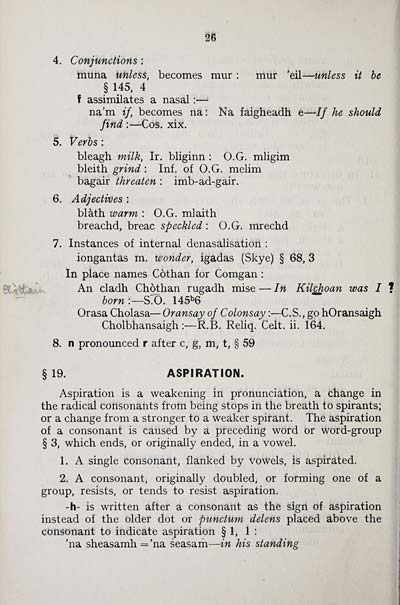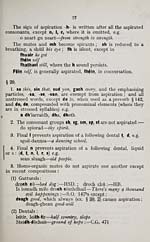Matheson Collection > Gaelic grammar, containing the parts of speech and the general principles of phonology and etymology, with a chapter on proper and place names
(46)
Download files
Complete book:
Individual page:
Thumbnail gallery: Grid view | List view

4. Conjunctions :
muna unless, becomes mur : mur 'eil — unless it be
§ 145, 4
f assimilates a nasal :• —
na'm if, becomes na : Na faigheadh e — // he should
find : — Cos. xix.
5. Verbs:
bleagh milk, Ir. bliginn : O.G. mligim
bleith grind : Inf. of O.G. melim
bagair threaten : imb-ad-gair.
6. Adjectives :
blàth warm : O.G. mlaith
breachd, breac speckled : O.G. mrechd
7. Instances of internal denasalisation :
iongantas m. wonder, igadas (Skye) § 68, 3
In place names Còthan for Comgan :
6tJiij(^v. An cladh Ghòthan rugadh mise — In Kilchoan was I ?
born:— S.O. HS^e
Orasa Cholasa— Oransay of Colonsay : — C.S., go hOransaigh
Cholbhansaigh :— R.B. Reliq. Celt. ii. 164.
8. n pronounced r after c, g, m, t, § 59 ^
§ 19. ASPIRATION.
Aspiration is a weakening in pronunciation, a change in
the radical consonants from being stops in the breath to spirants;
or a change from a stronger to a weaker spirant. The aspiration
of a consonant is caused by a preceding word or word-group
§ 3, which ends, or originally ended, in a vowel.
1. A single consonant, flanked by vowels, is aspirated.
2. A consonant, originally doubled, or forming one of a
group, resists, or tends to resist aspiration.
-h- is written after a consonant as the sign of aspiration
instead of the older dot or punctum delens placed above the
consonant to indicate aspiration § 1, 1 :
'na sheasamh = 'na seasam — in his standing
muna unless, becomes mur : mur 'eil — unless it be
§ 145, 4
f assimilates a nasal :• —
na'm if, becomes na : Na faigheadh e — // he should
find : — Cos. xix.
5. Verbs:
bleagh milk, Ir. bliginn : O.G. mligim
bleith grind : Inf. of O.G. melim
bagair threaten : imb-ad-gair.
6. Adjectives :
blàth warm : O.G. mlaith
breachd, breac speckled : O.G. mrechd
7. Instances of internal denasalisation :
iongantas m. wonder, igadas (Skye) § 68, 3
In place names Còthan for Comgan :
6tJiij(^v. An cladh Ghòthan rugadh mise — In Kilchoan was I ?
born:— S.O. HS^e
Orasa Cholasa— Oransay of Colonsay : — C.S., go hOransaigh
Cholbhansaigh :— R.B. Reliq. Celt. ii. 164.
8. n pronounced r after c, g, m, t, § 59 ^
§ 19. ASPIRATION.
Aspiration is a weakening in pronunciation, a change in
the radical consonants from being stops in the breath to spirants;
or a change from a stronger to a weaker spirant. The aspiration
of a consonant is caused by a preceding word or word-group
§ 3, which ends, or originally ended, in a vowel.
1. A single consonant, flanked by vowels, is aspirated.
2. A consonant, originally doubled, or forming one of a
group, resists, or tends to resist aspiration.
-h- is written after a consonant as the sign of aspiration
instead of the older dot or punctum delens placed above the
consonant to indicate aspiration § 1, 1 :
'na sheasamh = 'na seasam — in his standing
Set display mode to: Large image | Transcription
Images and transcriptions on this page, including medium image downloads, may be used under the Creative Commons Attribution 4.0 International Licence unless otherwise stated. ![]()
| Permanent URL | https://digital.nls.uk/76600687 |
|---|
| Description | Items from a collection of 170 volumes relating to Gaelic matters. Mainly philological works in the Celtic and some non-Celtic languages. Some books extensively annotated by Angus Matheson, the first Professor of Celtic at Glasgow University. |
|---|
| Description | Selected items from five 'Special and Named Printed Collections'. Includes books in Gaelic and other Celtic languages, works about the Gaels, their languages, literature, culture and history. |
|---|

